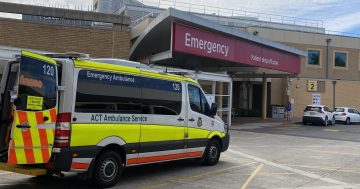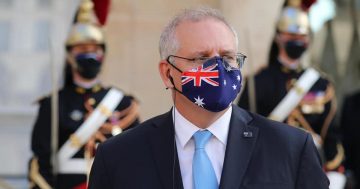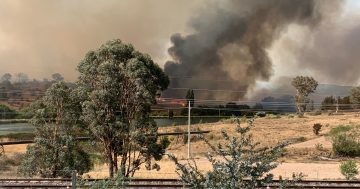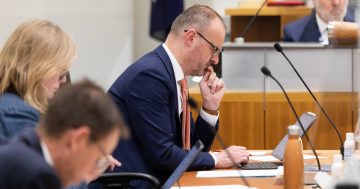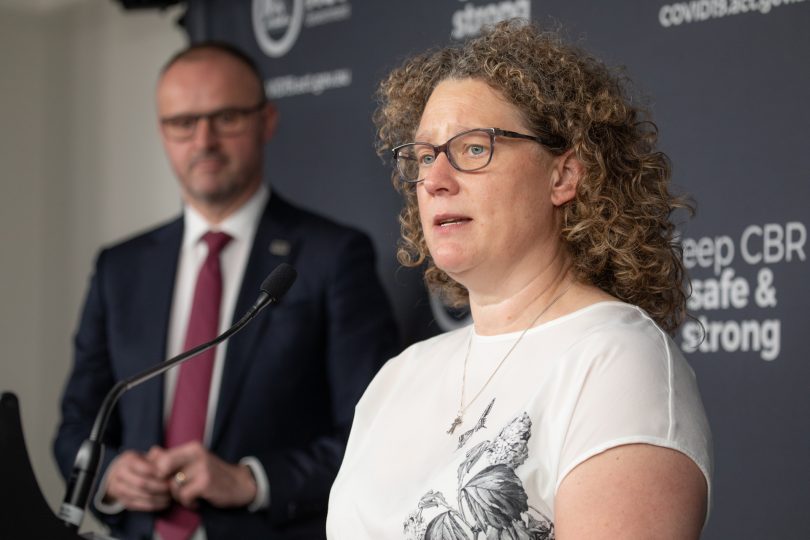
ACT Chief Health Officer Dr Kerryn Coleman defended ACT Government communications of the travel rules yesterday. Photo: Michelle Kroll.
UPDATED 5:30 pm: The Public Health Direction that defined ‘fully vaccinated’ as two weeks after the second vaccine dose only came into effect yesterday afternoon due to a “drafting error”, a spokesperson for ACT Health has confirmed.
According to the Government, some people who had travelled to a high-risk zone in either NSW or Victoria needed to quarantine as 14 days had not yet elapsed since their second dose of the vaccine.
But this 14-day lag was only officially added to the Public Health Direction yesterday (3 November).
According to a Health Direction that came into effect on Monday (1 November), people were considered fully vaccinated seven days after receiving both doses.
This was repealed when yesterday’s came into force.
Deputy Leader of the Opposition Giulia Jones has slammed the government for what she described as a “cover-up”.
“This is retrospective rule-making that results in people being unfairly asked to quarantine,” she said.
“Perfectly reasonable Canberrans who have checked the rules are having the rules changed under their feet.”
A spokesperson for ACT Health said several changes had to be made to the Public Health (COVID-19 Affected Areas) Emergency Direction 2021 (No. 11) yesterday, “including amending the definition of fully vaccinated to reflect the intended policy approach, amending the definition of a medical contraction certificate, as well as correcting some terminologies and typographical errors”.
The changes made to the Public Health Direction brought it into line with the advice provided on the exemption form, the spokesperson said.
ACT Health said only seven people have been affected by the amended Directions and they are working closely with them.
“For travellers who are on the cusp of meeting the ‘fully vaccinated’ definition, the ACT Health Exemptions Team has been calling individuals to discuss the requirements and available options,” the spokesperson said.

The ACT Government has moved to clarify travel rules and their definition of ‘fully vaccinated’. Photo: Region Media.
The ACT Government has now updated its website and clarified travel rules after some Canberrans had to quarantine after returning from high-risk areas interstate because they were not considered ‘fully vaccinated’.
This is because the ACT defines someone as being fully vaccinated – for travel purposes – two weeks after the second dose of a COVID-19 vaccine.
Authorities have conceded messaging around this caveat to the rules should have been clearer.
“There’s a bit of a mea culpa on that one. I think we could have been clearer on identifying that was the requirement,” Health Minister Rachel Stephen-Smith said.
Before Wednesday (3 November), this was only noted on the ACT exemption form rather than on the website itself.
Some Canberrans only found out about it when they filled in their exemption forms upon their return.
Currently, anyone who is ‘fully vaccinated’ is permitted to travel freely into hotspot areas of NSW and Victoria and return to the ACT as an automatic exemption is granted to these travellers.
Chief Minister Andrew Barr and Chief Health Officer Dr Kerryn Coleman outlined these new rules last week, but this was not specifically outlined at the press conference.
Yesterday, Dr Coleman sought to defend government communications on the matter, saying her advice to people travelling has always been to understand their obligations under the jurisdiction they are leaving and the one they are entering.
Dr Coleman said they would update the website to make the information more explicit for travellers and noted ACT Health would work with people who may currently be in 14-day-quarantine to see if this period could be shortened as the individual may surpass the fortnight lag time.
The Chief Health Officer said she’d repeatedly spoken about the two to three weeks it takes for a vaccine to become fully effective. Unfortunately, some people had not realised this could impact their ability to travel.
Dr Coleman said she could understand people’s disappointment about not travelling as freely as they would have liked.
In the ACT, unlike NSW and Victoria, few people are required to ‘prove’ their vaccination status unless they are workers covered by a vaccine mandate or, now, are travellers, and there’s no differentiation between the freedoms afforded to vaccinated and unvaccinated people.
A person is considered ‘fully vaccinated’ in NSW and Victora as soon as they can provide evidence of their second dose.
Generally, the vaccine certificate is available within 24 to 48 hours, so a person could ostensibly enjoy freedoms such as going to a cafe or non-essential retail as soon as that.
Neither state has imposed a two-week wait time before a person is considered fully vaccinated.
With the changes to NSW restrictions announced earlier this week, unvaccinated Canberrans aged 16 and up will not be able to travel into NSW until after 15 December or when the state reaches 95 per cent double vaccination (whichever is first).
Initially, freedoms were to be opened up to unvaccinated people on 1 December.
On the other hand, fully vaccinated people will have greater freedoms from 8 November.
There will be no limit on household visitors, no density rules for outdoor gatherings of less than 1,000 people and nightclub dance floors will open up.
A tranche of other changes will also come into effect from that date.












